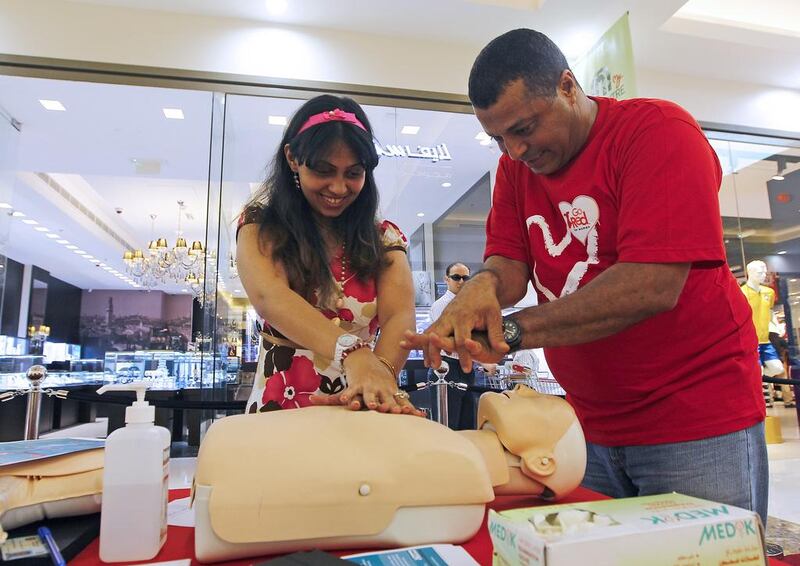Campaign conducts 3,685 checks in the Northern Emirates
SHARJAH // Women in Sharjah were the latest in the UAE to be encouraged to check their cardiovascular health at a free initiative being run in conjunction with Al Qassimi Hospital.
The initiative, held at My City Centre yesterday, is part of Go Red for Women, a global campaign founded by the American Heart Association to raise awareness about the world’s number one killer of women – cardiovascular disease.
The drive has travelled around malls in the Northern Emirates since May 2, during which time 3,685 women have received free screenings, including body mass index tests, blood pressure tests and have had their blood-sugar levels checked to detect diabetes.
Boubaker Beltaief, a life-support instructor for the Ministry of Health, is part of the team. “It’s very useful to give us a picture of what’s out there,” he said.
“While the number of men suffering from these diseases is decreasing, the number of women [suffering] is increasing. Social changes mean more women are working, so the diseases are often stress-enduced – they are running a home, looking after the family and working. Like the men, with a lack of time, they are also eating junk food.”
Dr Ahmed Nejib, a cardiologist from Al Qassimi Hospital in Sharjah has also been on the tour. “We’ve discovered a lot of people suffering with diseases who didn’t even realise it,” he said.
About 20 to 30 per cent had been diagnosed with conditions such as hypertension and diabetes, and were referred from the temporary stations at the malls to local hospitals.
“Among the Filipino ladies, they have high blood pressure and hypertension, and among the Arab ladies, it’s diabetes and high cholesterol,” Dr Nejib said.
The team advises women on lifestyle and diet changes, such as taking more regular exercise. “These screenings have been a real success. I think they should be done more frequently, perhaps every three months,” Dr Nejib said.
Fatma Hillal, head of diabetes education at Al Qassimi Hospital, said women simply did not look after themselves because they were preoccupied with caring for their families.
“Some simply don’t know of the risks of things like high cholesterol, but many just worry more about their husbands and children,” she said. “We need more education like this to encourage them to have regular screenings. It’s as important as breast screening, especially for women aged 40 and over, whose activity levels begin to decrease, combined with bad diets.”
The campaign has visited 30 countries since it began five years ago, including Kuwait, Lebanon and Oman.
Sally Samy, 29, a housewife and pharmacist from Egypt, came to get tested after hearing about the drive during the week. “I’m not a very healthy or active person, so thought I should be checked,” she said. “It’s good to be able to detect these kinds of diseases early.”
Leah Lara, 41, a housewife from the Philippines, gets health screenings every year. “I’m quite concerned about health. I’ve never had problems but, for my age, I must maintain and monitor my health, especially for cholesterol and diabetes,” she said.
mswan@thenational.ae





